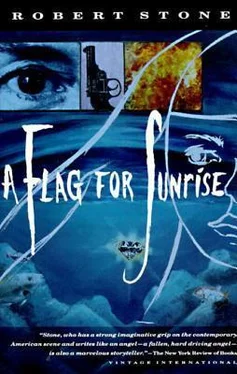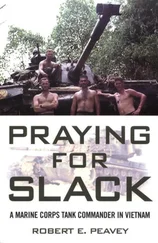Robert Stone - A Flag for Sunrise
Здесь есть возможность читать онлайн «Robert Stone - A Flag for Sunrise» весь текст электронной книги совершенно бесплатно (целиком полную версию без сокращений). В некоторых случаях можно слушать аудио, скачать через торрент в формате fb2 и присутствует краткое содержание. Год выпуска: 2012, Издательство: Vintage, Жанр: Современная проза, на английском языке. Описание произведения, (предисловие) а так же отзывы посетителей доступны на портале библиотеки ЛибКат.
- Название:A Flag for Sunrise
- Автор:
- Издательство:Vintage
- Жанр:
- Год:2012
- ISBN:нет данных
- Рейтинг книги:4 / 5. Голосов: 1
-
Избранное:Добавить в избранное
- Отзывы:
-
Ваша оценка:
- 80
- 1
- 2
- 3
- 4
- 5
A Flag for Sunrise: краткое содержание, описание и аннотация
Предлагаем к чтению аннотацию, описание, краткое содержание или предисловие (зависит от того, что написал сам автор книги «A Flag for Sunrise»). Если вы не нашли необходимую информацию о книге — напишите в комментариях, мы постараемся отыскать её.
A Flag for Sunrise — читать онлайн бесплатно полную книгу (весь текст) целиком
Ниже представлен текст книги, разбитый по страницам. Система сохранения места последней прочитанной страницы, позволяет с удобством читать онлайн бесплатно книгу «A Flag for Sunrise», без необходимости каждый раз заново искать на чём Вы остановились. Поставьте закладку, и сможете в любой момент перейти на страницу, на которой закончили чтение.
Интервал:
Закладка:
“What the fuck’s the matter?” Pablo demanded, holding up his Stateside prescription bottle. “I got a script for it back home.”
The pharmacist ignored the bottle and gave Pablo not so much as a shrug. Two young female assistants in green smocks watched them over the stacks of medicated shampoo.
“I’m overweight,” Pablo said grimly. He was not in the least overweight and in any case the druggist did not understand him. “I’m fucking depressed, dig? How about it?”
When the druggist extended a hand to urge Pablo toward the door, Pablo prepared to belt him. Only at the last minute did he realize that the man’s attention was focused on the pink bank note he clutched in his left hand.
The druggist was trying to escort Pablo discreetly outside, an urbane effort which Pablo’s nature resisted.
“ Tiene que volver a la tarde ,” the man said softly, trying to speak beneath the hearing of his assistants. “ Más tarde, comprende? Ahorita no. ”
By the time they reached the street, Pablo was able to understand that he was being dealt with.
“O.K.,” he said. Passers-by were observing his exchange with the pharmacist. Glancing at his reflection in the drugstore window, Pablo saw that if he did not appear particularly fat and low-spirited, he did look rather like a bad-news gringo who might shortly be in jail.
“ Más tarde , right?” Pablo asked the druggist. The professional man turned hurriedly inside.
It was hard to be cool. For one thing, the birdcalls were driving him bananas; they kept sounding like someone making fun of him. Pablo reflected that he had been strung out in some shitty places but that none of them seemed quite so shitty as Vizcaya, where even the birds in the trees weirded you out. He wiped his brow and turned down the Calle Catorce de Mayo, toward the piers and Lana’s.
Lana’s establishment was called the Pensión Miramar, a little stone barracks of a building that gave two rows of barred windows to the street. It centered on a small interior courtyard with a dying jacaranda tree from which ten low wooden doors led to the girls’ apartments. A baby was crying in one of the rooms as Pablo came in; there was always a baby crying somewhere in Miramar. Three dark children, scroungy with gutter dirt, were stalking a cat among the crates and bottles under the tree.
Pablo went to the Coke cooler behind the office and pounded on it with his fist several times. Presently a youth of about fourteen came out, unlocked the cooler and gave him a beer for a fifty-centavo piece. There was no change — there was never any change.
Disgusted and worn, he sat down on a wooden bench near the tree and tried not to let the birdcalls get to him. When I straighten out, he thought, I’ll have a plan. The kids in the courtyard began to throw crates at the cat. Pablo drank his beer and watched them irritably. Everything was a trapeze act.
When one of the children kicked a bottle at the cat and smashed it, Lana came out and yelled at the lot of them. One of the kids was hers. She saw Pablo and sat down beside him on the bench.
“You get somethin’ to make you feel good?”
“I thought you was gonna get me something,” Pablo said. “I can’t deal with these people down here.”
“Thas all right,” Lana assured him. “We take care of you.”
“You ain’t doing much of a job,” Pablo told her.
Lana moved closer to Pablo on the bench and reached over to take a swallow of his beer.
“Don Jorge says you can bring the maricón here. If he’s got a lot of money we help you take care of him. But it got to be at night, Don Jorge says.”
“Who gets his money?”
“Some for everybody,” Lana said.
Pablo put the beer bottle down.
“What am I supposed to do — kill him? Is that what I’m supposed to do?”
Lana shrugged. She had lived for two years in Coney Island, she once told Pablo. Off Surf Avenue, by the projects.
“I don’t know nothing about it, man. I just tellin’ you what Don Jorge says.”
“Don Hor-hay says,” Pablo said bitterly. “I ain’t hustling queers for Don Jorge. And I sure as shit ain’t gonna kill nobody for Don Jorge.”
Don Jorge was the proprietor of the Miramar and of the bar beside it. A big man with gray wavy hair who always wore dark glasses — you saw him all up and down the waterfront streets bullshitting, doing some kind of bad business.
As far as Pablo could tell, they wanted him to bring the queer down there and kill him. Then they could turn him in.
Gotta get out of here, Pablo thought. Time to walk.
“How about you all give me my passport back?” he said to Lana. “I need it. I can’t identify myself without it.”
“Baby, I don’t have your passport. Maybe Don Jorge has it. Maybe you owe him money — something like that.”
“I don’t owe him nothing,” Pablo said. “If anything, you all owe me.”
Lana hastened to say that she knew nothing about it.
“But you can bring that man here tonight,” she reminded Pablo. “Then he can’t cause you no trouble.”
Pablo stood up. “I’m gonna go see him now,” he told Lana.
Trucking back up Catorce de Mayo toward the zócalo , Pablo noticed a young American couple in backpacks; he wondered immediately about how much money they might have on them. He himself was down to seventy dollars — not counting the local money. His clothes and his passport were in the custody of the Miramar, probably lost to him.
Shoeshine boys harried him across the square, right to the door of the tourist hotel, hissing and whistling like the sinister birds. Inside he dried out in the air conditioning, checked the curio stand and the magazine rack, watching the hotel flunkies for bad eyes or wrong signals. No one seemed to notice him.
Tony Bobbick, the rich maricón , was not to be seen. After waiting a few minutes, Pablo sauntered into the poolside restaurant and ordered coffee at the counter.
The question of Tony Bobbick was a difficult one. On the one hand Pablo was a family man; it was degrading to hustle fags and he was a bit old for it. On the other, Tony Bobbick seemed to be Vizcaya’s best-known and most popular mark, famous from one end of town to the other for his wealth and the variety of his credit cards. It was a period when credit cards were a popular novelty in Mesoamerica; the locals had acquired the necessary machines and were dispensing rental cards and plane tickets with Yankee dispatch and Old World courtesy on signatures which they could barely read, let alone verify. Relatively untouristed, they still relied on the rigor of North American commercial procedures and the Code Napoléon. Pablo — strung out on his trapeze, obsessed with birds and incipient gonorrhea — was lamed by indecision and scruple.
But I got to walk, he thought. Get clear of this Vizcaya.
As he sat hunched over his excellent Compostelan coffee, brooding on Tony Bobbick, the man himself appeared. In blue duck trousers, Adidas, and a Triumph tee shirt, Tony settled himself at a table against the window that looked out on the garden and the pool. He drank greedily of the purified water which the waitress brought and laid out the previous day’s Miami Herald before him.
Tabor sighed, hesitated for a moment to assume what he hoped might be a pleasant or even desirable aspect and approached Tony’s table.
“Hey, guy,” Pablo said cheerily. Although he had dealt with many homosexuals in the course of his career, he remained under the impression that they all addressed each other in this fashion. “How you feeling this morning?”
Bobbick looked up wearily and did not invite him to sit down.
“Good morning,” he said.
Tabor stood over Tony Bobbick’s table with a dreadful smile. Not a grain of good humor was left to him and the very sight of the man’s boyish face, drawn and sagging with toxins, caused him to clench his fists. He found it extremely difficult to begin a conversation.
Читать дальшеИнтервал:
Закладка:
Похожие книги на «A Flag for Sunrise»
Представляем Вашему вниманию похожие книги на «A Flag for Sunrise» списком для выбора. Мы отобрали схожую по названию и смыслу литературу в надежде предоставить читателям больше вариантов отыскать новые, интересные, ещё непрочитанные произведения.
Обсуждение, отзывы о книге «A Flag for Sunrise» и просто собственные мнения читателей. Оставьте ваши комментарии, напишите, что Вы думаете о произведении, его смысле или главных героях. Укажите что конкретно понравилось, а что нет, и почему Вы так считаете.












